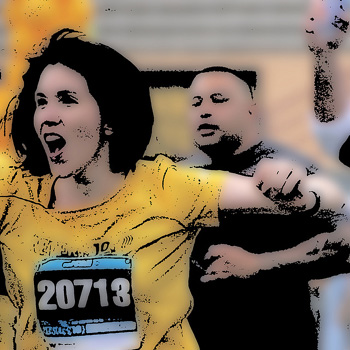Becoming more productive is hard, isn’t it?
You could be an aspiring athlete who is struggling to juggle the demands of work and family with a demanding training schedule.
Or maybe you want to write an eBook to promote your business, but you just can’t to find the time to write.
Or you perhaps you’ve been tasked with managing an important client project, and your team is struggling to make genuine progress.
I’ve spent a lot of time studying popular productivity methods like Getting Things Done and the 7 Habits of Highly Effective People.
Although the language varies from method to method, putting first things first, small wins and cultivating useful daily habits are three proven strategies that anyone can use to increase productivity.
1. Put First Things First
Putting first things first is a simple but effective productivity strategy.
The secret to this approach is to put first things first the night before your working day.
That night, make a list of what you want to accomplish during the following day. Rank them in order of most to least important.
Then the following day, do the most important thing from your list before you attend to anything else. Once you’ve accomplished this task, progress to the second most important task. And so on.
If you’re training for a marathon, go for a run before work or as soon as you get home. Train before you do anything that could distract you.
If you’re managing a client project, focus on this project in the morning before you answer emails, attend meetings or check social media feeds.
And if you want to publish an eBook, write for at least one hour – don’t worry about perfect prose – before moving on to your next most important task for the day.
Putting first things first works because when you’re interrupted during the day (as often happens in a busy office), you will have already accomplished your most important task for the day.
2. Cultivate Productive Habits
The cue-routine-reward formula is key to the formation of more productive habits.
Charles Duhigg describes this in his excellent book: “The Power of Habit: Why We Do What We Do in Life and Business”.
Duhigg writes, “Want to exercise more? Choose a cue, such as going to the gym as soon as you wake up, and a reward, such as a smoothie after each workout.
“Then think about that smoothie , or about the endorphin rush you’ll feel. Allow yourself to anticipate the reward. Eventually, that craving will make it easier to push through the gym door everyday.”
Although Duhigg is describing exercise in this example, you can apply Duhigg’s cue-routine-reward formula to cultivate more productive habits.
Duhigg says as much: “Anyone can use this basic formula to create habits of her or his own.”
For example if you want to write an eBook to promote your business, your cue to write could be an alarm clock that sounds an hour before work in the morning.
Your routine could then be to sit down and edit the previous day’s work before getting dressed or having breakfast.
And your reward could be a cup of coffee after you’ve finished editing or writing for half an hour.
If you want to train for a marathon, your cue to run could be a pair of runners that you leave by the door, your routine could be the time you put them on at, and your reward could be a glass of chocolate milk (it’s full of protein!) or a favourite TV show.
You could even try creating the habit of happiness.
Whatever your approach, these productive habits will help you accumulate small wins.
3. Harness the Power of Small Wins
Small wins are like single steps during a long race, with each one bringing you closer to the finish line.
Small wins can also help you overcome barriers in your work preventing you from making real progress.
For example, if you’re struggling to write an eBook, try writing a blog post that you can use as part of this eBook.
When you’ve completed this blog post, return to the the more troublesome parts of the eBook. They will almost always feel easier because you can build on a previous accomplishment.
Similarly, if you’re a manager of a team working on a client project, you can celebrate small wins and motivate your team.
If, for example, a social media campaign is a success, you could send a congratulatory email to the rest of your team that thanks them for working hard and which motivates them to keep progressing this important project.
A small win will give you the confidence, and your team the momentum, you all need need to complete future tasks and realise important goals.
If you put first things first, cultivate productive daily habits and harness the power of small wins you can overcome these problems and become more productive.
What was your last small win? Have you cultivated any productive daily habits? How do you increase productivity?
Please let me know in the comments section below.
You can also reach me on Twitter or we can connect on Google+.
About Bryan
Bryan writes a popular blog about non-fiction writing on WorkReadPlay.com.
If you’re interested in getting a free a guide to Twitter for Time-strapped Writers and Business People, please visit workreadplay.com
Photo Credit: kevin dooley via Compfight cc













Thanks for the great post Bryan, cultivating habits has been huge for me. I think it might be the only way for lazy people to get things done!!
Every win builds confidence no matter how small, so keep taking action to reach your goals.
I like your first tip to start the day with the most important task, rather “than eating a frog” and doing the stuff I don’t want to do first. I’m going to give that a try!
I’m glad you enjoyed the post.
At the end of each day I try to pick out my most important task for tomorrow. Typically that involves a writing project. If I do this for several days, the power of small wins kicks in.
Thanks for reading.
Thanks for this post Bryan. Now I’ve got an unbeatable team on my side: the power of small wins standing right next to the power of gratitude.